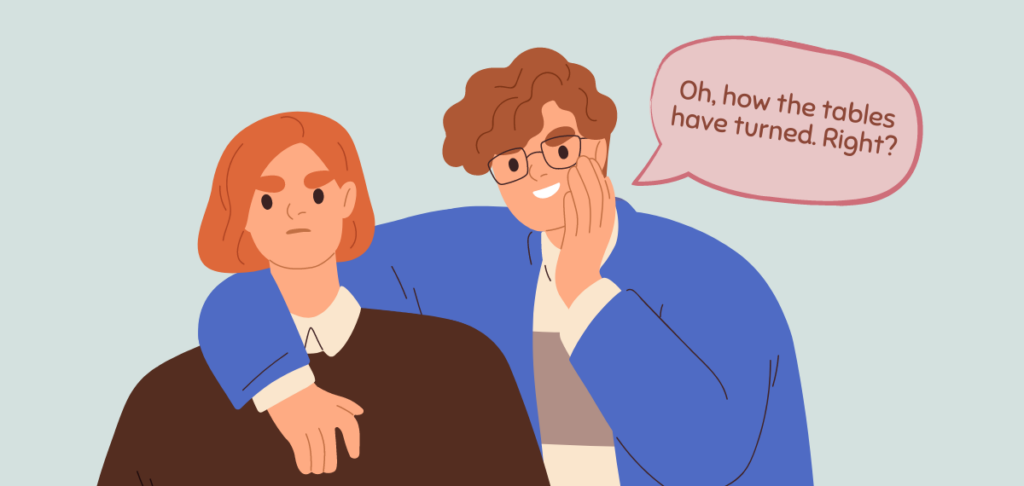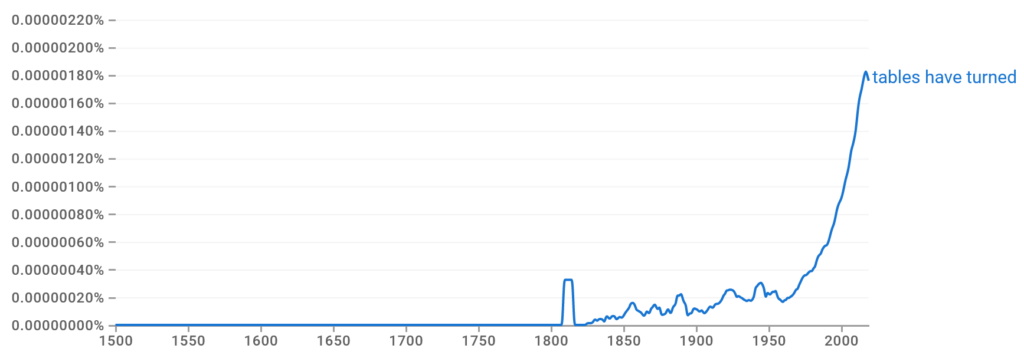Tables have turned is an idiomatic expression signifying a significant reversal of circumstances, usually spoken by the person who suddenly benefits from the situation. It’s a phrase that encapsulates the moment when the underdog comes out on top or when fortunes change hands unexpectedly.
Idioms, such as tables have turned are expressions whose meaning cannot inferred from the literal combination of words they comprise. They’re essential to the English language because they carry history in their words and give us creative ways to communicate.
To use it correctly, you must understand the details of its deeper meaning and how it originated. So, in this article, I’ll break down all those details plus share some variations, related terms, and examples of its usage.

What Does the Idiom Tables Have Turned Mean?
The idiom tables have turned means that a situation has reversed or changed dramatically, often resulting in a role reversal or a shift in power dynamics.
The Cambridge Dictionary defines the idiom turn the tables as “to change from being in a weaker position in relation to someone else to being in a stronger position.”
It’s used in situations where there’s a complete reversal of circumstances or power. Imagine the roles are suddenly reversed, especially in a competitive or adversarial context, where the person previously disadvantaged gains the upper hand.
This idiom makes me think of a situation currently unfolding in the author/publishing world. An up-and-coming author had her debut fantasy novel picked up by a huge publisher. Readers were genuinely excited about it, myself included. It sounded like an amazing read, and I couldn’t wait to get my hands on it.
But, for some reason, this author decided to try and cut out her competition (psst, there’s no competition among your fellow authors! Readers demand an endless supply of books they love). She took the time to create dozens of fake Goodreads accounts and review bomb all the other debut authors in her genre, plus give her own book a ton of fake five-star reviews. Gasp!
But the bookish community is not to be trifled with. Readers and other authors picked up on it, nailed her with proof, and shared it online for the world to see. Within one day, her publisher dropped her, and thousands of real readers took to Goodreads to give her book one star.
That is a clear-cut karmic case of having the tables turned.
Literal Meaning vs. Figurative Meaning
The literal meaning of tables have turned is a strange mental image indeed. Picture a room full of tables turned upside down. Now, you might assume this is where the idea that sparked the metaphorical expression came from, but it’s not. I’ll explain the origin in a moment. Figuratively, it speaks to the change in dynamics, power, or fortunes between individuals or groups.
Variations of the Idiom
These variations share the same essence of a dramatic change in circumstances but can be used differently based on context.
- Turn the tables
- I’ve turned the tables
- Tables turned
- How the tables have turned
- Now the table has turned
How Is Tables Have Turned Commonly Used in Context?
The idiom tables have turned is frequently employed to describe situations where a notable reversal or transformation has occurred. This expression captures the essence of a dramatic change, often involving a shift in power dynamics, roles, or outcomes.
In various contexts, this idiom can be used to convey surprise, irony, or the unexpected nature of a particular turn of events. To gain a deeper understanding of its usage, explore the following sections:
What Are the Different Ways to Use Tables Have Turned?
- In competitive sports: To describe a team that gains an advantage after being at a disadvantage. “We were down three points the entire game, but the tables turned in the last minute, and we gained the lead.”
- In personal narratives: To express a personal triumph after a period of struggle. “After living paycheck to paycheck for so long, the tables finally turned, and I landed a well-paying job.”
- Writing fiction: A scene between the protagonist and antagonist after the power shifted. “The tables have turned, and I have the high ground now. You’ll never hurt anyone else ever again.”
What Are Some Tips for Using Tables Have Turned Effectively?
- It’s best used in situations involving competition or conflict.
- It’s an ideal phrase for storytelling or discussions where you want to emphasize a dramatic change.
- Combine it with descriptions of past struggles for a more impactful narrative.
Where Can You Find Examples of Tables Have Turned?
Because it’s often used to dramatize a sudden change in fortunes, status, or power, this idiomatic expression has been thrown around in literature, film, and music for years.
The song “Turning Tables” by Adele comes to mind. It takes the idiom and simplifies it down to two words. Singer-songwriter Ralph also uses parts of the idiom in her song “Table Have Turned.” And, on the topic of music, we can’t discuss this phrase without mentioning that crazy 2008 viral video from The Jonas Brothers, aptly named “Oh, How the Tables Have Turned.”
In literature, the timeless 1798 poem “The Tables Turned” by William Wordsmith has been referenced in schools even today. It’s all about nature and how important it is to value it over all else.
What Is the Origin of the Idiom Tables Have Turned?

The idiom tables have turned originated from board games, actually, specifically ones like backgammon that have been played since the 17th century. Players would physically turn the board to face them when it was their turn; the tables have turned, and now the power is in that person’s hands.
How Did the Idiom Evolve Over Time?
From its gaming origins, the phrase evolved during the 1800s into a popular metaphor in literature and everyday language to describe any situation where there is a reversal of fortunes.
What Are Some Related Terms to Tables Have Turned?
While it perfectly captures the idea of a power exchange, it’s a rather long phrase and might not always fit in the context you need it to. So, these synonyms are great alternatives to the phrase tables have turned. The antonyms work excellently if you wish to convey the opposite.

Synonyms
- Role reversal
- Change of fortune
- The shoe is on the other foot
- Things have changed
- In my house now
- Turning the tide
Antonyms
- Status quo
- No change
- Steady course
Tables Have Turned: Test Your Knowledge!
Choose the correct answer.
What Have We Learned About Tables Have Turned?
The idiom tables have turned is a powerful expression that captures life’s unpredictable nature. It’s a way to describe how the fortunes can change, often dramatically, and those who were once in a dominant position can find themselves on the other side of the table.
I covered all the details about its meaning and origin, discussed variations and alternatives, and gave you a few real-life examples of its use. So, the next time you witness or experience a major turnaround, you can aptly say, “Ah, how the tables have turned!” Get into more idiomatic expressions with our other quick, detailed articles.
Check out some others we covered:
